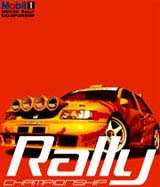Mobil 1 Rally Championship
Mobil 1 Rally Championship (officially called Mobil 1 British Rally Championship, also released as Rally Championship 2000 Edition in some European countries and occasionally referred to as such even outside of those territories) is a rally video game which is part of the Rally Championship series. The game was released for Windows in 1999. It is developed by Magnetic Fields, distributed by Electronic Arts (NA), HotGen and Atod (PSX), and published by Actualize. The Windows version is notable for stages based on real-life Ordnance Survey and Ordnance Survey of Northern Ireland maps.
| Mobil 1 Rally Championship | |
|---|---|
 | |
| Developer(s) | Magnetic Fields Creative Asylum Limited |
| Publisher(s) | Actualize Electronic Arts (NA), HotGen, Atod (PSX) Europress Software |
| Composer(s) | Darren Ithell |
| Series | Rally Championship |
| Platform(s) | Microsoft Windows, PlayStation |
| Release | Windows PlayStation
|
| Genre(s) | Racing |
| Mode(s) | Single player, Multiplayer |
After the Network-Q RAC Rally Championship (1996), it is a sequel to the International Rally Championship (1997).
Music
The soundtrack for Mobil 1 Rally Championship was composed by Darren "Dith" Ithell.[1]
Reception
| Reception | ||||||||||||||||||||||||||||||
|---|---|---|---|---|---|---|---|---|---|---|---|---|---|---|---|---|---|---|---|---|---|---|---|---|---|---|---|---|---|---|
| ||||||||||||||||||||||||||||||
Adam Pavlacka reviewed the PC version of the game for Next Generation, rating it three stars out of five, and stated that "Not quite the best rally game out there, but it is definitely a contender."[10]
The Windows version of the game received positive scores and ratings, and was considered to have high quality graphics for its time of release. The PlayStation version was less popular and rated lower.
References
- AmigaPD (May 2012). "Interview with Darren Ithell". AmigaPD. Retrieved 4 September 2014.
- "Mobil 1 Rally Championship Review (PC)". Metacritic. CBS Interactive. Retrieved 14 October 2014.
- "Mobil 1 Rally Championship Review (PS1)". Metacritic. CBS Interactive. 14 October 2014.
- http://www.metacritic.com/game/pc/mobil-1-rally-championship
- Sanders, Shawn (1 April 2000). "Mobil 1 Rally Championship Review (PS1). The cannonball that missed the run". GameRevolution. Net Revolution Inc. Retrieved 14 October 2014.
- Poole, Stephen (28 February 2000). "Mobil 1 Rally Championship Review (PC). Mobil 1 Rally Championship puts you as close to the action as you could ever hope to get". GameSpot. CBS Interactive. Retrieved 14 October 2014.
- Lopez, Miguel (6 April 2000). "Mobil 1 Rally Championship Review (PS1). In terms of an overall package, EA's V-Rally 2 and Colin McRae have much more to offer than Mobil 1". GameSpot. CBS Interactive. Retrieved 14 October 2014.
- Devidas, Arun (8 March 2000). "Mobil 1 Rally Championship Review (PC). If you like Rally racing, you'll be in heaven". IGN. Ziff Davis. Retrieved 14 October 2014.
- Nix, Marc (30 March 2000). "Mobile 1 Rally Championship Review (PS1). Failed Game Concept #1: A racer without steering". IGN. Ziff Davis. Retrieved 14 October 2014.
- Pavlacka, Adam (April 2000). "Finals". Next Generation. Vol. 3 no. 4. Imagine Media. p. 94.